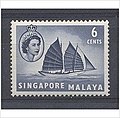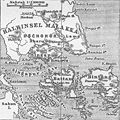Portal:Singapore
 Map of Singapore Singapore, officially the Republic of Singapore, is an island country and city-state in maritime Southeast Asia. The country's territory comprises one main island, 63 satellite islands and islets, and one outlying islet. It is about one degree of latitude (137 kilometres or 85 miles) north of the equator, off the southern tip of the Malay Peninsula, bordering the Strait of Malacca to the west, the Singapore Strait to the south along with the Riau Islands in Indonesia, the South China Sea to the east, and the Straits of Johor along with the State of Johor in Malaysia to the north.
Singapore's history dates back at least eight hundred years, having been a maritime emporium known as Temasek and subsequently a major constituent part of several successive thalassocratic empires. Its contemporary era began in 1819, when Stamford Raffles established Singapore as an entrepôt trading post of the British Empire. In 1867, Singapore came under the direct control of Britain as part of the Straits Settlements. During World War II, Singapore was occupied by Japan in 1942 and returned to British control as a separate Crown colony following Japan's surrender in 1945. Singapore gained self-governance in 1959 and, in 1963, became part of the new federation of Malaysia, alongside Malaya, North Borneo, and Sarawak. Ideological differences led to Singapore's expulsion from the federation two years later; Singapore became an independent sovereign country in 1965. After early years of turbulence and despite lacking natural resources and a hinterland, the nation rapidly developed to become one of the Four Asian Tigers. As a highly developed country, it has one of the highest GDP per capita (PPP) in the world. It is also identified as a tax haven. Singapore is the only country in Asia with a AAA sovereign credit rating from all major rating agencies. It is a major aviation, financial, and maritime shipping hub and has consistently been ranked as one of the most expensive cities to live in for expatriates and foreign workers. Singapore ranks highly in key social indicators: education, healthcare, quality of life, personal safety, infrastructure, and housing, with a home-ownership rate of 88 percent. Singaporeans enjoy one of the longest life expectancies, fastest Internet connection speeds, lowest infant mortality rates, and lowest levels of corruption in the world. It has the third highest population density of any country in the world, although there are numerous green and recreational spaces as a result of urban planning. With a multicultural population and in recognition of the cultural identities of the major ethnic groups within the nation, Singapore has four official languages: English, Malay, Mandarin, and Tamil. English is the common language, with exclusive use in numerous public services. Multi-racialism is enshrined in the constitution and continues to shape national policies in education, housing, and politics. Singapore is a parliamentary republic in the Westminster tradition of unicameral parliamentary government, and its legal system is based on common law. While the country is de jure a multi-party democracy with free elections, the government under the People's Action Party (PAP) wields widespread control and political dominance. The PAP has governed the country continuously since full internal self-government was achieved in 1959, and holds a supermajority in Parliament. One of the five founding members of ASEAN, Singapore is also the headquarters of the Asia-Pacific Economic Cooperation Secretariat, the Pacific Economic Cooperation Council Secretariat, and is the host city of many international conferences and events. Singapore is also a member of the United Nations, the World Trade Organization, the East Asia Summit, the Non-Aligned Movement, and the Commonwealth of Nations. (Full article...)Selected article -Money No Enough (Chinese: 钱不够用; pinyin: Qián Bǔgòu Yòng) is a 1998 Singaporean comedy film written by Jack Neo, directed by Tay Teck Lock, and produced by JSP films. The movie stars Neo, Mark Lee and Henry Thia as three close and best friends who start a car polishing business together to resolve their financial problems. Released in cinemas on 7 May 1998, the film received mixed reviews from critics but earned over S$5.8 million and was the all-time highest-grossing Singaporean film until 2012. Its success helped revive the Singaporean film industry and pave the way for the emergence of other Singaporean cultural phenomena. It was followed by a second standalone installment titled Money No Enough 2, which was directed by Neo, and also starring Thia, Lee and Neo himself, and was released during the National Day period on 31 July 2008. A third standalone installment titled Money No Enough 3, was also directed by Neo and also stars Lee, Thia and Neo himself, and was released during Chinese New Year period on 1 February 2024. (Full article...) Selected picture The baggage collection point of Changi Airport's Terminal 3. The green wall can be seen on the right. Read more... General imagesThe following are images from various Singapore-related articles on Wikipedia.
Selected biography -Feng Tianwei PJG (Chinese: 冯天薇; pinyin: Féng Tiānwēi, pronounced [fə̌ŋ tjɛ́nwéi]; born 31 August 1986) is a Singaporean retired table tennis player. Born in China, she permanently moved to Singapore in March 2007 at the age of 20 under the Foreign Sports Talent Scheme and commenced her international career in competitive table tennis the following month. Feng represented Singapore for the first time in the Olympic Games at the 2008 Summer Olympics in Beijing. On 15 August 2008, the Singapore team comprising Feng and her teammates Li Jiawei and Wang Yuegu defeated South Korea 3–2 in the semifinals. The team lost to China in the final, obtaining the silver medal. This was Singapore's first Olympic medal in 48 years and its first as an independent nation. (Full article...) Did you know (auto-generated)
In this month
More did you know -
Selected panoramaThe National University of Singapore (Abbreviation: NUS; Chinese: 新加坡国立大学; pinyin: Xīnjiāpō Guólì Dàxué; Abbreviated 国大; Malay: Universiti Kebangsaan Singapura; Tamil: சிங்கப்பூர் தேசியப் பல்கலைக்கழகம் ) is Singapore's oldest university. It is the largest university in the country in terms of student enrollment and curriculum offered. Singapore topicsRelated portalsSoutheast Asia Other Countries Tasks
CategoriesWikiprojectsAssociated WikimediaThe following Wikimedia Foundation sister projects provide more on this subject:
Discover Wikipedia using portals |































































